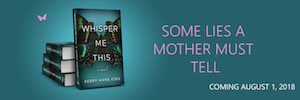

Purchase here: https://www.kerryanneking.com/


Purchase here: https://www.kerryanneking.com/
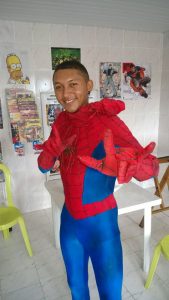
I met Sullivan through a writerly Facebook friend who hires him to illustrate his stories. His work is fantastic, so I asked him for an interview. He graciously agreed, and here I can share his work with you and offer a peek behind the scenes at his artistic process.
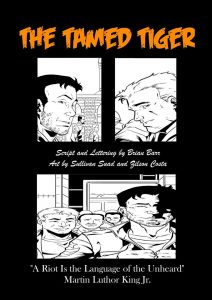 Describe your artistic process—schedule, materials, studio, and inspirations.
Describe your artistic process—schedule, materials, studio, and inspirations.
Let’s start with inspiration—my inspiration comes from everything I’ve read that I’ve seen and lived. It comes from all that. The comic gave me everything, gave me my work, gave my culture, gave the taste for reading; the comic led me to like various things. Although my family did not encourage me much, the first time I won a comic, I found it fascinating. I thought, “This is what I want to do.” While other kids said they wanted to be doctors, lawyers, or football players, I said I wanted to work for Marvel drawing Spider-Man. HAHAHA!!! My studio is my bedroom. Here I work and develop everything. The materials I use are conventional—I am still learning to adapt to the use of technologies. The creative process comes when the script itself arrives; you read and begin to internalize the scenes. So I do. I imagine it and play it all on paper soon.
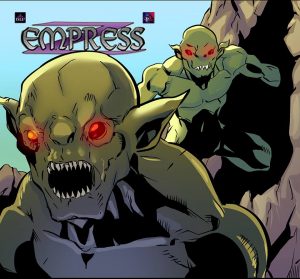 Tell me about your support system, online and in real life.
Tell me about your support system, online and in real life.
I can say that who supports me in my work, both in real life and online, is my teammate Zilson Costa. It has been a few years since we started an excellent partnership, and this has paid us good results. Our production chain begins when the client sends us the script, and it comes to me that I make only the pencil sketch. After I do the drawing, I send it to Zilson, who puts in the ink.
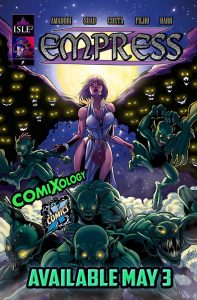 How do you obtain clients, and is all your work specific to clients?
How do you obtain clients, and is all your work specific to clients?
I already have some specific clients, others are by indication. But I am always divulging my portfolio to get new jobs.
How does your life influence your art and vice versa?
I counted on the influence of several friends, also comic book fans–who were an incentive for me to gradually learn everything as a self-taught artist. The inspiration came from Marvel and DC Comics.
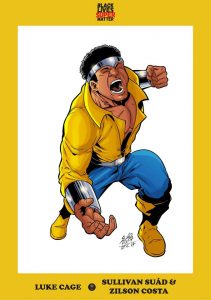 What do you love most about your creativity?
What do you love most about your creativity?
It may seem heresy on my part, but I love my profession, because it is like playing a little god. You create, give a life to a character, and lead a whole universe of possibilities—it is something incredible. I wanted to finish here and leave a positive message about all this: Never stop studying, the market is always changing and you need to update. If you do not practice every day, you will surely miss an opportunity for someone who practices every day. As for the financial part, those who work with comics can earn as well as any other professional in another area. It only depends on it, not only as a drawer, but as a person who knows how to take advantage of the opportunities; after all if you follow a career for the status of that money always, there would not be so many lawyers changing branches. The beginning is always complicated, no matter the area or profession. You will grate, you will work double, and you will receive little. But if you sneak in and keep on evolving your work, believe me—there’s never going to be a lack of opportunity and money can be interesting.
Connect with Sullivan
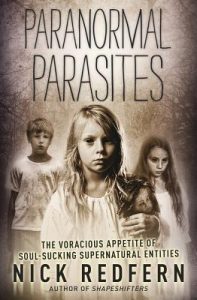 Basically, this book attempts to warn humans that they are being farmed like cattle across planet Earth as food for energy entities, inter-dimensional and extraterrestrial, who wish to eat souls. Redfern, author of 30+ books on UFOs, Bigfoot, and cryptozoology, takes readers through the minutia of anecdotal evidence for cryptids, some timeworn, a bit somewhat newer, all of it always fun and interesting. The book begins with an explanation of supernatural energy, or orgone, as defined by Wilhelm Reich, and immediately launches into soul stealing creatures from around the world. It’s hard to tell if Redfern is writing tongue-in-cheek, or in full belief; Llewellyn is the publisher—the latter is more likely. As with inexplicably grainy (in this day and age of technology?) videos of cryptids, so the personal stories, including those of alleged personnel of mysterious / forbidden locations, such as Area 51 (according to Redfern, there’s a secret facility miles underground in New Mexico), border on requiring suspension of belief. Silently dismissing mental illness or other more pragmatic sources, the author relays seemingly supernatural events as fact. Even with prior knowledge of the medical condition behind experiences of succubi and incubi, the chapters on these sexually demanding night creatures are disturbingly realistic. However, mythological lore is explored through the story of Lilith, who links Paganism, Judaism, and Christianity, as a relevant dark, feminine archetype. The highlight of the book is the concept of a tulpa, an entity created by focused energy of a group of people, with Slenderman being the most well known. Readers who accept spiritual entities for granted will be scared out of their wits by this book. Others who take it with a grain of salt will appreciate it for further forays into global legends, myths, and folklore. I was fortunate to receive an early copy of this fascinating book from the publisher #Lewellyn through #NetGalley.
Basically, this book attempts to warn humans that they are being farmed like cattle across planet Earth as food for energy entities, inter-dimensional and extraterrestrial, who wish to eat souls. Redfern, author of 30+ books on UFOs, Bigfoot, and cryptozoology, takes readers through the minutia of anecdotal evidence for cryptids, some timeworn, a bit somewhat newer, all of it always fun and interesting. The book begins with an explanation of supernatural energy, or orgone, as defined by Wilhelm Reich, and immediately launches into soul stealing creatures from around the world. It’s hard to tell if Redfern is writing tongue-in-cheek, or in full belief; Llewellyn is the publisher—the latter is more likely. As with inexplicably grainy (in this day and age of technology?) videos of cryptids, so the personal stories, including those of alleged personnel of mysterious / forbidden locations, such as Area 51 (according to Redfern, there’s a secret facility miles underground in New Mexico), border on requiring suspension of belief. Silently dismissing mental illness or other more pragmatic sources, the author relays seemingly supernatural events as fact. Even with prior knowledge of the medical condition behind experiences of succubi and incubi, the chapters on these sexually demanding night creatures are disturbingly realistic. However, mythological lore is explored through the story of Lilith, who links Paganism, Judaism, and Christianity, as a relevant dark, feminine archetype. The highlight of the book is the concept of a tulpa, an entity created by focused energy of a group of people, with Slenderman being the most well known. Readers who accept spiritual entities for granted will be scared out of their wits by this book. Others who take it with a grain of salt will appreciate it for further forays into global legends, myths, and folklore. I was fortunate to receive an early copy of this fascinating book from the publisher #Lewellyn through #NetGalley.
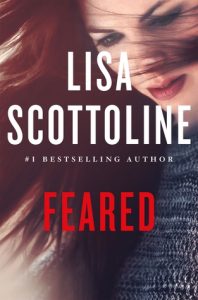 In this continuation of the Rosato and DiNunzio series with alphabetized titles, Mary’s pregnancy weighs heavily in the story. Tables are turned on the firm when they are sued, and murder comes too close to home, with one of their own a person of interest. Unrelated to the discrimination case, religious bias seems to crack the fourth wall, as the lawyer for the firm comes across as ineffectual in his lackadaisical, eastern spirituality approach. The clue that exposes the murderer is generic and far-reaching as conclusive evidence. The writing is solid and flows, but the storyline and accoutrements fall short of Scottoline’s brilliance despite her winning formula. With Mary the lead in this book, her family makes broad appearances, which is always welcome to DiNuinzio fans. As a novel in a series, it’s worth reading for the continuity in anticipation of “G***”. I was fortunate to receive an early copy from the publisher #St.Martin’sPress through #NetGalley.
In this continuation of the Rosato and DiNunzio series with alphabetized titles, Mary’s pregnancy weighs heavily in the story. Tables are turned on the firm when they are sued, and murder comes too close to home, with one of their own a person of interest. Unrelated to the discrimination case, religious bias seems to crack the fourth wall, as the lawyer for the firm comes across as ineffectual in his lackadaisical, eastern spirituality approach. The clue that exposes the murderer is generic and far-reaching as conclusive evidence. The writing is solid and flows, but the storyline and accoutrements fall short of Scottoline’s brilliance despite her winning formula. With Mary the lead in this book, her family makes broad appearances, which is always welcome to DiNuinzio fans. As a novel in a series, it’s worth reading for the continuity in anticipation of “G***”. I was fortunate to receive an early copy from the publisher #St.Martin’sPress through #NetGalley.
TITLE
The Heart of Aleppo: A Story of the Syrian Civil War
AUTHOR
Ammar Habib
GENRE
Young Adult / Contemporary / Current Events
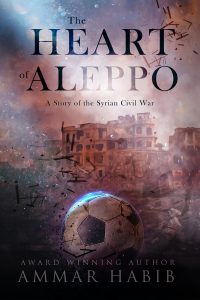 After standing for over 7,000 years, Aleppo’s ruin came overnight. Separated from his family during the night the rebels attacked the city, thirteen-year-old Zaid Kadir is lost in the middle of a war zone. Alongside his friends, he is forced to survive the dangers of a civil war he does not even fully understand. Zaid witnesses the destruction of the brutal Syrian Civil War as it grows more deadly by the day and rips his city apart. However, as he braves this destruction, as he desperately tries to survive this catastrophe, he discovers something. Zaid realizes that it is in the darkest hours when humanity’s spirit of hope burns brightest.
After standing for over 7,000 years, Aleppo’s ruin came overnight. Separated from his family during the night the rebels attacked the city, thirteen-year-old Zaid Kadir is lost in the middle of a war zone. Alongside his friends, he is forced to survive the dangers of a civil war he does not even fully understand. Zaid witnesses the destruction of the brutal Syrian Civil War as it grows more deadly by the day and rips his city apart. However, as he braves this destruction, as he desperately tries to survive this catastrophe, he discovers something. Zaid realizes that it is in the darkest hours when humanity’s spirit of hope burns brightest.
EXCERPT
Two days before Nabeel leaves for the last time, I find him standing at the kitchen counter with his friend, Zakariah. I don’t know his rank, but Zakariah serves directly under Nabeel in the army and only lives two miles down the road. The two of them always seem to be on leave at the same time.
Their voices are low, almost secretive, but I catch the look in Nabeel’s eye. Except back then, I didn’t recognize it.
“What are you guys talking about?”
Seeing me enter and hearing my voice, they both look my way before exchanging glances. That gleam in Nabeel’s eyes disappears.
I excitedly run up to the two of them. “Tell me!”
Nabeel looks back down at me as he stops leaning against the counter. Reaching down, he ruffles my hair. “You’re too young to know about that, Zaid.”
“Aww, what’s that about? I’m not part of the group now—”
My brother playfully flicks me on the forehead as he crouches down a little. “I’m sorry, buddy. Maybe next time.”
“You’re always saying that.”
Zakariah laughs as he comes closer to me. He puts his hand on my shoulder. “That’s just not fair, Nabeel. You’re a horrible brother for leaving Zaid out like that.”
I see a concerned expression momentarily wash over Nabeel’s face.
However, Zakariah glances up at Nabeel and shoots him a quick wink as he continues. “Why don’t I just tell you then?”
My eyes light up. “Really! You’re the best, Zakariah.”
Coming to his knees, he puts his arm around my shoulders and leans close, acting as if he is about to tell me the world’s biggest secret. “You see, Zaid, your brother and I were having a discussion about which one of us would win in a wrestling match. We all know that I’m stronger, but he just won’t admit it.” He sighs and shakes his head as he looks back at Nabeel. “But you agree with me, don’t you, Zaid?”
I don’t hesitate to respond. “No way!”
He moves his head back in surprise. “Huh?”
“Sure you’re pretty strong, but my brother would beat you!”
Zakariah is slow to reply, taken aback by the statement. “C’mon, Zaid. You do realize that I’m older than him—”
“Age has nothing to do with it, Zakariah! My brother was the school’s wrestling champion. He wouldn’t lose to you.” I whip my head to look back at Nabeel. “Right, big brother?”
Nabeel is slightly smiling now.
With a chuckle, Zakariah rises back to his feet. “Alright, alright. Well, I best be off, Nabeel. We can finish our little discussion next time.”
Nabeel shakes his hand. “Give my greetings to your folks.”
“I will.” Zakariah grabs my shoulder and gives it a squeeze. “See you, Zaid—no, sorry: Dr. Zaid.”
Did he really just call me that? How did he know?
Hearing Zakariah’s footsteps grow faint, I turn back to Nabeel. He opens the fridge door and rummages through it.
“You told him?” I ask.
Nabeel doesn’t look my way. “I tell everyone.”
I watch him pull out a pound of chicken meat rolled up in brown paper as he turns back to me.
“Aisha is visiting her parents tonight and Abbi and Ummi are having dinner with friends. So looks like it’ll just be you and me.” Nabeel shoots me a wink. “I’m going to make some shwarma for dinner. Just the way you like it: tomatoes, lettuce, onions, lots of chicken, and even more spices.” He starts setting the ingredients on the countertop. “I went by Sohail’s shop today. The mangoes he was selling were ripe, so I picked some up. We can have them for dessert. That is if we have room.”
He looks back at me with a smile, but it fades when he sees my expression.
“What’s wrong, Zaid?”
I glance at the ground before replying, “I don’t think I want to be a doctor anymore.”
“Why not?”
“…I don’t think I can.”
He takes a few steps towards me before crouching down to come to my eye level, urging me to continue.
“Ms. Farooq said I’m not smart enough.”
“She did?”
“I got the lowest score in the class on the last math test. She said I’m not cut out for it.”
“I didn’t realize Ms. Farooq could tell the future.”
I don’t respond.
“Did you tell Abbi or Ummi?”
I shake my head.
He takes a deep breath and glances down at my feet. His eyes look like he’s weighing something, wondering if he should say it or not. When he does speak, his voice is different. It’s no longer speaking to me as his younger brother but as his friend. “You know, Zaid, Zakariah was joking about what we were talking about.”
“Really?”
He nods before his gaze focuses back on me. “Not even a few weeks ago, my soldiers and I were in a bit of a… well, situation.”
“What happened?”
“We were in Homs. The people we were fighting—the rebels—had heavy control of some neighborhoods. We were trying to take them back. It was…”
A silence ensues as he searches for the word.
“Difficult.” Nabeel pauses. “Some soldiers were pinned. The army tried an airstrike to break the rebel lines. It was a heavy bombardment that leveled entire streets. The cost was high. But we couldn’t break their lines.”
I don’t interrupt him.
“Our intelligence said it was a lost cause. We were ordered to abandon the soldiers. They said we would lose more men than we would save. But even the army’s ‘intelligence’ doesn’t know everything.” He looks away. “Zakariah and I disobeyed our commanding officer. As did our men. Those soldiers that were pinned weren’t just men. They were my friends… my brothers. And I would never abandon them, even if it led to…”
For a moment, his eyes again display that same gleam, but it disappears as quickly as it came.
His gaze again meets mine. It’s firmer this time, stronger. “It doesn’t matter what people say, Zaid. It doesn’t matter what the facts say. All that matters is what you say. And, maybe more importantly, what you do.”
I hang on his words, unable to say anything.
“Why do you want to be a doctor, Zaid?”
“I’ve always wanted to.”
“But why?”
“Because… I don’t want to see people suffer. I… I want to be the one to help others. I want to save lives, make a difference and put others before myself. I want to make this world a better place. Just like the Imam always talks about.”
Nabeel smiles. “Never forget that. And never go back on your word. No matter what happens. Please never forget one thing, Zaid: I love you. No matter the circumstance—no matter if I’m so far from you that you may never see me again, know that I’m with you.” He presses his finger against my heart. “I believe in you, Zaid.”
REVIEWS
Goodreads: https://www.goodreads.com/book/show/40199729-the-heart-of-aleppo
PURCHASE
Amazon: https://www.amazon.com/Heart-Aleppo-Story-Syrian-Civil-ebook/dp/B07D7HQ53C
NOVEL PURPOSE
I, Ammar Habib, personally believe that the Syrian Civil War is one of this generation’s greatest tragedies. With the way it is proceeding, it’ll be remembered by future generations in the same manner that we remember the Rwandan genocide and the Bosnian War of the 1990s.
The motivation for writing this story was simple: I wished to bring more global attention to this crisis. Although the characters are fictitious, this novel accurately depicts the events that transpired in Aleppo during the summer of 2012. I hope that reading this will lead readers to have a greater understanding of the plight those in Syria face, as well as those in other war-torn regions. If this work helps garner more attention for those in Syria, then I will have considered this project a success.
In an over-politicized world, my wish is for this work to humanize those we call “refugees”. This book is not about the politics of the Syrian Civil War or any other conflict. Its aim is not to convince readers to support any faction or political party. Instead, this story is about the unbreakable spirit of humanity. It is about how humanity often shows its true strength during the darkest times
WRITING PLAYLIST
1. “Sadness and Sorrow”
https://www.youtube.com/watch?v=wEWF2xh5E8s&t=0s&list=LLBxVJMhFpqkREP81ev8SIwQ&index=34
2. “Sound of Hugh Glass”
https://www.youtube.com/watch?v=O1qIV3WXZFE&t=0s&list=LLBxVJMhFpqkREP81ev8SIwQ&index=31
3. “Despair”
https://www.youtube.com/watch?v=8O1RTYnzUuo&t=0s&list=LLBxVJMhFpqkREP81ev8SIwQ&index=32
4. “Man of the World”
https://www.youtube.com/watch?v=TkQLJ2KzsKA&t=0s&list=LLBxVJMhFpqkREP81ev8SIwQ&index=2
AUTHOR BIO
 Ammar Habib is a bestselling and award-winning author who was born in Lake Jackson, Texas in 1993. Ammar enjoys crafting stories that are not only entertaining but will also stay with the reader for a long time. Ammar presently resides in his hometown with his family, all of whom are his biggest fans. He draws his inspiration from his family, imagination, and the world around him.
Ammar Habib is a bestselling and award-winning author who was born in Lake Jackson, Texas in 1993. Ammar enjoys crafting stories that are not only entertaining but will also stay with the reader for a long time. Ammar presently resides in his hometown with his family, all of whom are his biggest fans. He draws his inspiration from his family, imagination, and the world around him.
AUTHOR SOCIAL MEDIA LINKS
Website: www.ammarahsenhabib.com
Facebook: https://www.facebook.com/ammarahsenhabib
Twitter: https://twitter.com/AmmarAHabib1 @AmmarAHabib1
Blog: www.ammarhabibblog.wordpress.com
Goodreads: https://www.goodreads.com/Ammar_Habib
Instagram: https://instagram.com/ammar.a.habib/ @Ammar.A.Habib
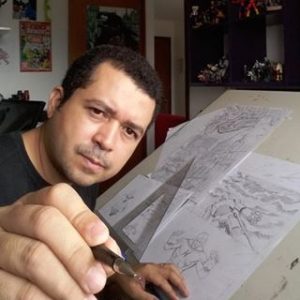
I met Zilson Costa through an author Facebook friend, who hires him as an illustrator. I’d asked about the work, because it’s so bold and detailed, almost jumping from the page. Fortunately, Zilson agreed to an interview, so here are his words and his work:
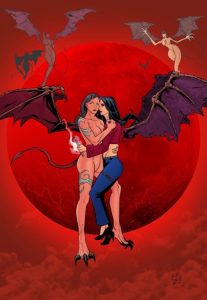
Describe your artistic process. When do you draw? What materials do you use? Do you have a dedicated studio? What are your inspirations?
I draw every day. I do this since childhood, but since 2012, I work as a comics professional in Brazil and the United States. I use pencil, paper, and my interactive pen tablet display to make inks and colors. I do this in my own studio, in my house. My main inspirations are the comics of John Buscema, Jack Kirby and the dynamism of the 90’s.
Through what avenues do you obtain commercial work?
Most of the work I do is through e-mails and social media networks, when I contact authors and vice versa.
Also, I create my own characters. I publish my own comics with the characters Skull-Man and Brazilian Legion of Super-Heroes, and in August, I will publish the comics inspired by my own band, Evil Machines.
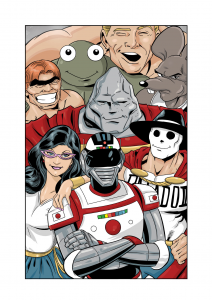
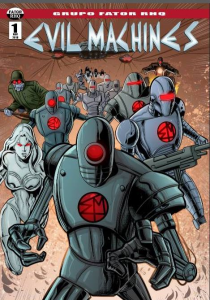
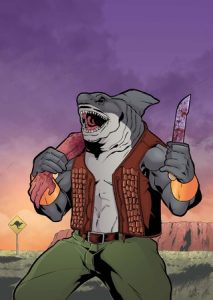
Tell me about your support system, online and in real life. Who are your biggest cheerleaders?
In fact, my wife and friends have always supported me in my work.
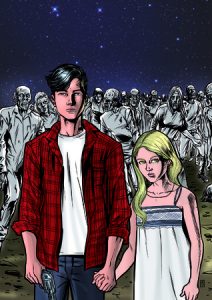
How does your life influence your art and vice versa?
I try to put in my work what I like. I like harmony, clarity and try to pass this on in my work. But I also really like superheroes. My art influences my life when I teach drawing techniques to my elementary school students and I see them growing as people. This is very rewarding.
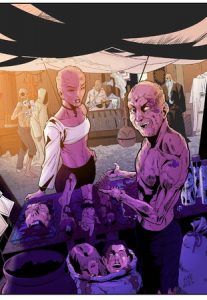
What do you love most about your creativity?
Like drawing, coloring, composing songs, playing my guitar… A lot of stuff.
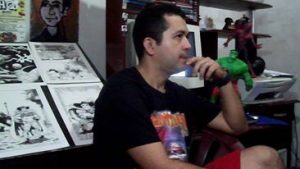 Links and Bio:
Links and Bio:
Zilson Costa has been a comic book author since 1996, a founding member of the RHQ Factor group. Born in São Luís, Maranhão, Brazil, he created the character Skull-Man and his entire universe based on experiences and people from school age. He works as a comic book professional since 2012 for American publishers, webcomics, and Brazilian authors. His first work for the US market was the story “The Origin of Shazrath” by the publisher Argo Comics. He holds an academic degree in Plastic Arts from the Federal University of Maranhão and teaches the art discipline at municipal schools in São Luís and São José de Ribamar. He is also a guitar player and founding member of the heavy metal band Evil Machines.
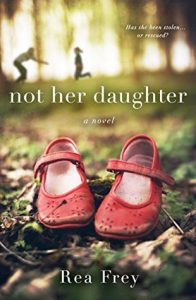 Sarah’s mother resented her existence, never failing to make her aware of the obstacle she is in life of a woman who believes she gave up fame to be a mother. So she may have been primed for kidnapping a little girl whose mother treated her in a similar manner. After a month on the run with the child, with all that entails—lying to friends and family, shifting work priorities, constant fear—Sarah’s conscience shifts. Coincidentally, her own mother contacts her after a lifetime of absenteeism.
Sarah’s mother resented her existence, never failing to make her aware of the obstacle she is in life of a woman who believes she gave up fame to be a mother. So she may have been primed for kidnapping a little girl whose mother treated her in a similar manner. After a month on the run with the child, with all that entails—lying to friends and family, shifting work priorities, constant fear—Sarah’s conscience shifts. Coincidentally, her own mother contacts her after a lifetime of absenteeism.
As though laying out with tweezers the contents of her life, Frey carefully portrays a mother who never wanted to be a mother in a way that even the most hardhearted reader can squeeze out a bit of sympathy for her. Confused, overwrought, overweight (the character focuses on this fact about herself excessively), she’s suspected of murdering her own child on circumstantial evidence she can’t refute. The fact that the mother wishes to improve herself redeems her, if only just. The child, however, seems way too well-adjusted and mentally healthy for the childhood she was enduring when she was taken. There was no groundwork laid to show her easy ability to make friends or readily accept changes not easily understood by small children. Even severely abused children cry for their mothers, and this one reached for hers after the mother’s hateful words of not loving her, so that completely assimilating into a new life, even a more positive one, so quickly seems to be less than credible. Furthermore, after the surprising turn of events at the climax, the father’s character inexplicably fades away.
This novel raises the question of who we really are to ourselves, as Sarah repeatedly states that she is not a kidnapper, though that is exactly what she is. It also points out the challenges of a legal system that cannot, for practical purposes, factor in emotional abuse of children in removing them from the home, though this seems irrelevant here. It seems unlikely that Montessori school officials would not have notified authorities regarding the bruises that covered the child’s arms and legs. Such obvious signs of physical abuse countered Sarah’s sense of morality. Without that aspect of the mother’s bad parenting, this story would have made more sense.
I was fortunate to receive an early copy from the publisher through NetGalley.
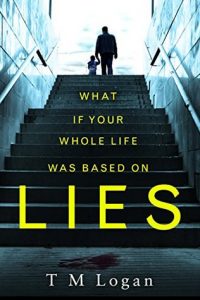 Joe Lynch espies his wife in a heated debate with their friend Ben at a hotel restaurant after his son sees mommy’s car and they follow her to say hi. After she leaves too quickly to follow, Joe confronts Ben, who laughs off his suspicions. His wife explains away the argument as Ben’s obsession with her; then Ben disappears. Suddenly, Joe is being framed for Ben’s murder, seemingly by Ben himself, so that Joe must find the purposely evasive man to clear his name.
Joe Lynch espies his wife in a heated debate with their friend Ben at a hotel restaurant after his son sees mommy’s car and they follow her to say hi. After she leaves too quickly to follow, Joe confronts Ben, who laughs off his suspicions. His wife explains away the argument as Ben’s obsession with her; then Ben disappears. Suddenly, Joe is being framed for Ben’s murder, seemingly by Ben himself, so that Joe must find the purposely evasive man to clear his name.
Logan deftly weaves in and out of the fast lane, with Joe’s wife Mel explaining away everything that Joe uncovers, to allay his fears until the next bombshell. The scene of resolution contains the dreaded trope of criminal shows, where the villain’s motivation and MO are thoroughly laid out—by the villain. The reveal explains questionable character actions that should have been questioned by Joe, but weren’t. All in all, the biggest bombshell will expose some readers’ unintended biases, and that’s okay. It’s good to shine the light into the nooks and crannies that seemed of no concern before, as uncomfortable as that can be, in order to become a better person. This book is a fast, fun read, and not soon to be forgotten. I was fortunate to receive an early copy from the publisher through NetGalley.

I’ll have to admit that the initial idea to write the song itself was not my own; it was the Viking’s. He wanted to know if perhaps I could write a song with the words from the book and play it at Mom’s next book signing. I was excited to take on the challenge, of course. As most of my friends and family know, I usually write hard rock songs, so it was a bit of a challenge to do justice to the words written in “Whisper Me This.” I had a guitar idea I had been playing around with earlier in the year that I ended up adapting to be the verse of the song. After this, the melody and cello part rang in my head as soon as I had figured out the general chord progressions.
The recording process was painless as Jimmy Hill of Amplified Wax took us through his flawless process of recording an acoustic song. It took about four hours to track the guitars, cellos, and vocals. I was fortunate enough to convince Keadrin Cain to join me in the studio as I had heard she was the best cello player in the area. Upon entering the studio, I found out that she was also able to sing. I immediately recruited her for harmonies. The harmonies were written in the studio with the help of Jimmy.

I’ve always felt self conscious of my voice, I still find myself picking apart my vocals and wishing I could fix several things. But Keadrin’s voice is such a perfect complement to mine that it makes me forget I even hate my voice. Overall, I’m exceptionally proud of the song and I think it represents the book well. I’m so excited to share it with everyone!
-Brandon
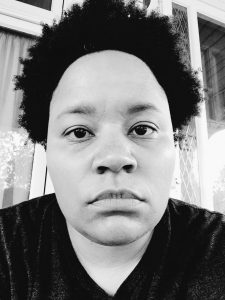
I met Paula through a writerly friend on Facebook. One story of hers and I’m hooked. She graciously agreed to an interview. As a horror fan, I’m delighted to share her work.
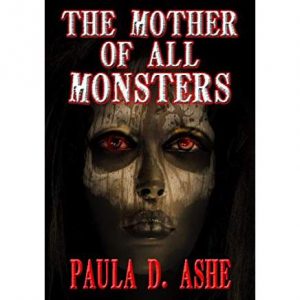 Describe your writing process: schedule, medium, environment, strategies / techniques, and inspirations mental, emotional, and material.
Describe your writing process: schedule, medium, environment, strategies / techniques, and inspirations mental, emotional, and material.
So, I used to be one of those writers who thought she had the luxury of waiting until she was in a certain setting, in a certain mood, with the certainty of uninterrupted hours available, before she could write anything. Then that writer never wrote anything, so now I write whenever I can, provided I’m mentally able to do so. My most recent short story publication was “Exile in Extremis” in the anthology Visions from the Void by Burdizzo Books. I wrote the bulk of the first draft of that story on my phone.
I wish I could tell you I have a schedule, I really do. I will someday.
It’s sweet that you think I have strategies and techniques. I mean, I’m sure I have them, I just am not self-reflective enough as a writer to know what they are.
Inspirations are abundant. I never run out of story ideas, I run out of the energy to tell them. I tend to write about the worst of humanity so, never a paucity of material, you know? Emotionally, I’m inspired by real-life stories that make me hurt. And like any sensitive/damaged person, I experience a pleasurable frisson from exploring that pain. So…a story like “All the Hellish Cruelties of Heaven,” which is about an immortal witch who falls in love with a serial killer (the story is much cooler than I’m making it sound), gave me the chance to play around with figuring out why people—or at least I—have such a fascination with humans who wantonly destroy other humans. It also gave me the opportunity to incrementally articulate the belief system / mythology that has been pocketed in most of my fiction without much fanfare.
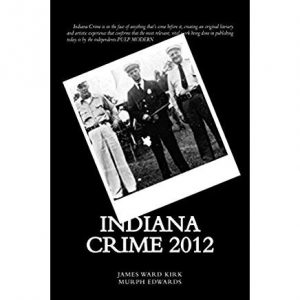 Talk me through the publishing process from final draft to final product and selling—who’s involved, what they do, and how much you contribute, especially to marketing.
Talk me through the publishing process from final draft to final product and selling—who’s involved, what they do, and how much you contribute, especially to marketing.
So the process is basically like this (a flowchart would work exceptionally well here):
– An editor invites me to sub something.
– I review the guidelines, especially the deadline, because I am the slowest writer on planet Earth.
– I scan my ‘stories in progress’ folder, to see if there’s anything I’m working in that fits the anthology’s theme. Rarely do things match up.
– I cogitate.
– I write. I’m sure this is supposed to be more exciting, but it’s just not. But it’s also the most exciting part.
– I inevitably miss the deadline because I’m me.
– I ask for an extension and am usually granted one (read: several).
– I submit the final draft, knowing it’s the final draft only because I’ve prodded that exposed nerve of a tale until it’s a bloodied pulp. All that’s left is the thrill of knowing the story will (likely) go on to intrigue and/or hurt other people. I honestly have no idea why I’m like this and I don’t want to know.
– Rarely, edits are requested. When they are, I generally comply. It’s the only benefit of being the slowest writer on Earth; I tend to do a thorough job of proofreading.
– Publication day! I post about it on social media, predominately Facebook. I’m really terrible at marketing.
– I let the editors ask for reviews because I feel weird asking people to review my work. If they want to read it and review it, they will. This is also why no one knows who I am..????♀️
 Who’s your support system, online and IRL? Does it shift as you progress from writing to publishing to marketing?
Who’s your support system, online and IRL? Does it shift as you progress from writing to publishing to marketing?
First of all, my wife is amazingly supportive throughout the process. I’m in several FB writing groups that offer support—Colors in Darkness and Ladies of Horror, and individually: Chris Ropes, Brian Barr, Crystal Connor, Suzi Madron, Eden Royce, and Christine Sutton, to name a dear few (I’m forgetting so many people and I’m sorry).
 How does your writing influence your life and vice versa? Did this change when you became a mother?
How does your writing influence your life and vice versa? Did this change when you became a mother?
So, I am a maudlin MF (I don’t know if I can curse in this interview…). I have…a multitude of mental illnesses—have had them since adolescence. My worldview is reflective of that. I write terrible stories about terrible people doing terrible things because…that’s how I have (by degrees) experienced the world. Now it’s not all been horrible, but the stuff that lingers…skews towards the dark. So, I love horror. I write horror, I read horror, I watch horror movies, I listen to true horror and true crime podcasts, I listen to dark and violent music (I listen to all sorts of music but there’s a theme here, yeah?).
I am a writer of the ‘nothing is off limits, provided there’s a reason’ variety. I’ve written about childhood sexual abuse, incest, necrophilia (all in one story!), serial killers, hate crimes, infanticide, mutilation, matricide, racism, patricide, ableism, religious cults, genocide, misogyny, xenophobia, etc. However, since my son was born, if I have a story where something…bad…happens to an infant or small child, my brain immediately substitutes him as that infant or small child. So, I have a sequel to “All the Hellish Cruelties of Heaven” in the works titled, “All the Heavenly Mercies of Hell” and something…bad…happens to an infant in that story, and although I’ve had most of the full story in my head for years, I just can’t bring myself to write it.
But I’ll have to.
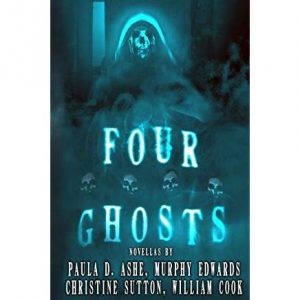
What do you love most about your creativity?
I rarely meet an idea I don’t like. I mean, there are plenty of half-started stories that I’ve abandoned for one reason or another, but there’s always some part of it I can appreciate. For that reason I save everything I write, because it often will work its way into another, more promising tale.
Author Extra: Write a flash fiction piece right now! 50 words, ma’am!
Someday she’ll remember. Now there’s only waiting. For what, she also can’t remember. This dim, cold, aching place has no secrets. Others like her—more patient, smarter—hidden in apartments with devoted lovers. She dosed there in the hall. Alone. Paralyzing pain.
Now she sits. Forgotten and forgetting.

Connect with Paula:

A small selection showcasing her talent: